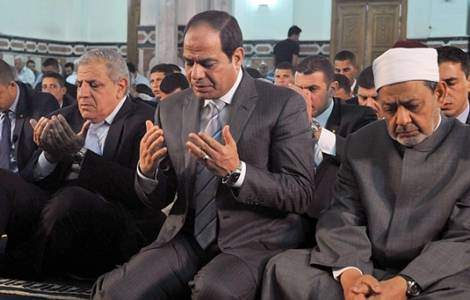
rivistaetnie.com
Cairo (Agenzia Fides) – The law in Egypt guarantees equal rights and duties for its Muslim and Christian citizens and the government should be on the lookout for “any attempt to insert a wedge between the two communities”. It follows that all perpetrators of sectarian violence or attacks will be prosecuted and punished according to the law because “Egypt has a rule of law ”. This is how Egyptian President Abdel Fattah al Sisi, voiced his position concerning recent sectarian clashes especially in the territory of Minya, where during a brawl last Sunday a Coptic Christian was killed by Muslim assailants. Speaking during a military certificate awarding ceremony, the President, a former general, appealed for religious harmony and reaffirmed his intention to prosecute anyone involved in sectarian violence.
In his address during the ceremony Al-Sisi urged all Egyptians to practice and to promote national unity, reaffirming that Egyptian law recognises Christian and Muslim citizens as equal. Following this intervention, Copt Orthodox Patriarch Tawadros II, after a brief meeting with President al Sisi, addressed the national press urging all citizens not to offer pretexts to persons aiming to take advantage of similar events to the detriment of a nation with a population of 90 million serious economic difficulties and scarcity of financial resources, “because their intention is to destroy our country”.
These statements by President al Sisi and Patriarch Tawadros follow similar words by Sheikh Ahmed al Tayyib, al Azhar Grande Imam, who issued a public statement calling all the populations of the region to opt for the path of reason in order to stem the spread of sectarian sedition (see Fides 21/7/2016). The organisation ‘Egyptian Initiative for Personal Rights’ has identified at least 77 episodes more and less serious of sectarian violence in the region di Minya since the so-called ‘revolution’ on 26 January 2011. At present, on many occasions penal measures to identify and punish those responsible for violence, have been replaced with what are termed “reconciliation meetings”, organised by the local authorities to bring together members of the different religious communities following clashes and convince them to make public acts of peace building. A practice considered by many ineffective which very often results in guaranteeing immunity for intimidators and perpetrators of violence . (GV) (Agenzia Fides 22/7/2016).
